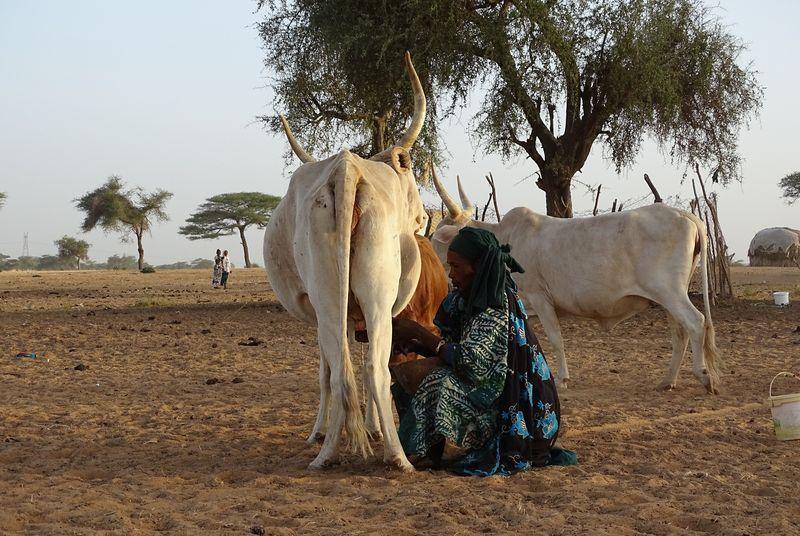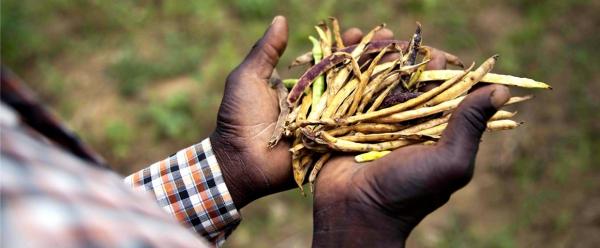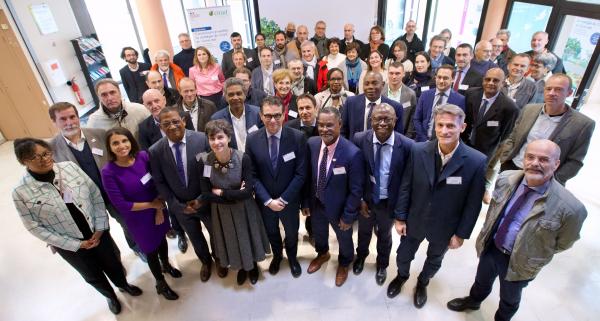Event 12 February 2024
- Home
- Press area
- Press releases
- Tackling the employment challenge by investing in food value chains in the Sahel
Tackling the employment challenge in the Sahel by investing in food value chains

Youth employment is a major priority in the Sahel. the food economy, including mixed farming, already employs two people in three. Here, milking at a Fulani camp in Diéri, Senegal © J.D. Cesaro, CIRAD
"Thirty million jobs will have to be created in the Sahel by 2025. Agriculture will be key." This was how AFD CEO Rémy Rioux introduced a conference, "Sahel, terre de défis et d’opportunités agricoles". The AFD is investing 700 million euros in the G5 Sahel countries (Mauritania, Mali, Burkina Faso, Niger and Chad) for their development. The projects funded by the AFD in the Sahelian zone - bordering countries in the southern Sahara, from Senegal to Djibouti - are supporting the structuring of agricultural value chains, agricultural skills training and work to adapt Sahelian farming systems to climate change.
Sahel, land of innovation
To adapt to climate change, the agricultural and food sector must innovate. This is why CIRAD is working with research and educational establishments in the Sahel, and with professional organizations in the sector. This longstanding partnership with such organizations was recently confirmed by the signing of the Ouagadougou Declaration, to "share a common vision of the future and of the scientific issues to be addressed now" , as CIRAD President Managing Director Michel Eddi puts it. He recalls CIRAD's vocation to provide solutions and responses co-built with stakeholders and local people, notably in view of the urgent need to adapt agriculture to climate change.
Investment to end insecurity
Meeting these challenges will require financial investment. Michel Eddi revealed the planned creation of an ambitious Europe-wide financial instrument to fund research and development projects, a large part of which will target the Sahel. "The Sahel is the top priority for our organizations and the French government", as Rémy Rioux and Bruno Ferreira, Assistant Head of Office responsible for diplomatic relations and agro-ecology at the French Ministry of Agriculture and Food, confirmed. Mr Ferreira stressed the importance of maintaining jobs in agriculture. Some 32 million new jobs could be created in and around the food economy and the agricultural sector in the Sahel in the coming decade. "We must rely on young people to innovate, and give them a future in rural areas." Zero hunger and malnutrition is also one of the United Nations Sustainable Development Goals (SDGs). The SDG in question concerns the whole range of stakeholders, since "Food insecurity can lead to insecurity full stop".
Developing irrigation and agricultural productivity
In his intervention, Mali's Minister of Agriculture Nango Dembélé illustrated the impacts of climate change on agriculture and pastoral livestock rearing in his country. "In Mali, this year, animal losses have been high; they have been dying of thirst. We have also been short of fodder. Competition for natural resources - access to water, land or fodder - is high and this has led to conflict." In this zone, agricultural production is 80% dependent on rainfall. "Right from June, we are asking ourselves whether it's going to rain." The Minister sees developing irrigation using the existing rivers, such as the Niger, as one way of boosting production, but he underlines the need to attract private investors, notably to develop irrigation schemes. "Public resources alone will not be enough." One other challenge is boosting agricultural productivity to limit the expansion of agricultural land, which reduces the area available for pastoral livestock and triggers conflict between crop and animal farmers.
"In Mali, we produce 10.5 million tonnes of cereals, yet we need nutritional support in several regions. Some 80% of our farmers barely produce enough for their family. We must go beyond small-scale family farming and develop producers' organizations in various value chains, from upstream to downstream", the Minister added. "Our research is determined to boost agricultural productivity in our country. We must support our least productive farmers."
Diversifying agricultural production
The Minister also recommends diversifying production operations. "Diversifying our sources of income is also a way of reducing risks." he is keen to promote three or four value chains in each major region, to ensure diversification throughout the country. "We cannot afford to focus on cereals alone. We must also look into polyculture mixed with animal production, for instance rearing small ruminants or poultry. Or arboriculture. Gum arabic, for instance, has created thousands of jobs in the packing sector."
Connecting farmers with emerging urban markets and creating jobs
The Minister feels that it is also important to look at how to juggle supplying urban markets - which are still in their infancy in the Sahel - and rural areas, and to create jobs that will attract young people "who don't necessarily want to work in the fields". Digital technology, agricultural input supply chains, credit management and food product processing are all new activities that must be developed for the whole production chain. As regards job creation, the Minister also mentioned opening rural services centres, giving access to agricultural services such as mechanization, and to fertilizers and improved seeds.
Catherine Geslain-Lanéelle, EU candidate for the post of FAO Director General, who also spoke at the conference, stressed the merits of the approach adopted in Mali for structuring its value chains, developing producers' organizations "to feed its people, its country, and other countries" and for considering food systems in their entirety so as to create attractive jobs for young people.


























